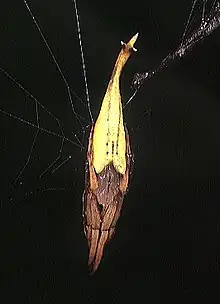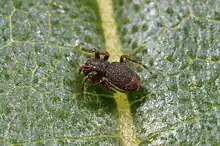| Arachnura | |
|---|---|
 | |
| A. melanura, female | |
 | |
| A. logio, male | |
| Scientific classification | |
| Domain: | Eukaryota |
| Kingdom: | Animalia |
| Phylum: | Arthropoda |
| Subphylum: | Chelicerata |
| Class: | Arachnida |
| Order: | Araneae |
| Infraorder: | Araneomorphae |
| Family: | Araneidae |
| Genus: | Arachnura Vinson, 1863[1] |
| Type species | |
| A. scorpionoides Vinson, 1863 | |
| Species | |
|
12, see text | |
Arachnura, also known as drag-tailed spider, scorpion-tailed spider and scorpion spider, is a genus of orb-weaver spiders that was first described by A. Vinson in 1863.[2] They are distributed across Australasia, Southern and Eastern Asia with one species from Africa.[1] Females can grow up to 1 to 3 centimetres (0.39 to 1.18 in) long, while males reach only 2 millimetres (0.079 in) long. The name is a combination of the Ancient Greek "arachne-" (ἀράχνη) and "uro" (οὐρά), meaning "tail". The tails are only present on females, but unlike the common names suggests, these spiders aren't related to scorpions. They curl up their tails when disturbed, but they are completely harmless. Bites are rare, and result in minor symptoms such as local pain and swelling.[3] They stay at the middle of their web day and night, and their bodies mimic plant litter, such as fallen flowers, twigs, or dead leaves.
Arachnura logio is called Kijiro o-hiki-gumo in Japanese. A. feredayi is commonly called Tailed forest spider. A. higginsi is often found in large numbers near water in Australia.
Species
As of February 2020 it contains twelve species, found in Africa, Oceania, and Asia:[1]
- Arachnura angura Tikader, 1970 – India
- Arachnura feredayi (L. Koch, 1872) – New Zealand
- Arachnura heptotubercula Yin, Hu & Wang, 1983 – China
- Arachnura higginsi (L. Koch, 1872) – Australia
- Arachnura logio Yaginuma, 1956 – China, Korea, Japan
- Arachnura melanura Simon, 1867 – India to Indonesia (Sulawesi) and Japan, Papua New Guinea, Australia (Queensland)
- Arachnura perfissa (Thorell, 1895) – Myanmar
- Arachnura pygmaea (Thorell, 1890) – Indonesia (Nias Is.)
- Arachnura quinqueapicata Strand, 1911 – Indonesia (Aru Is.)
- Arachnura scorpionoides Vinson, 1863 (type) – Congo, Ethiopia, Seychelles, Mayotte, Madagascar, Mauritius, Réunion
- Arachnura simoni Berland, 1924 – New Caledonia
- Arachnura spinosa (Saito, 1933) – Taiwan
In synonymy:
- A. longicauda Urquhart, 1885 = Arachnura feredayi (L. Koch, 1872)
See also
References
- 1 2 3 "Gen. Arachnura Vinson, 1863". World Spider Catalog Version 20.0. Natural History Museum Bern. 2020. doi:10.24436/2. Retrieved 2020-03-16.
- ↑ Vinson, A. (1863). Aranéides des îles de la Réunion, Maurice et Madagascar.
- ↑ "Scorpion-tailed Spiders". The Bug Chicks. Retrieved 2020-03-16.